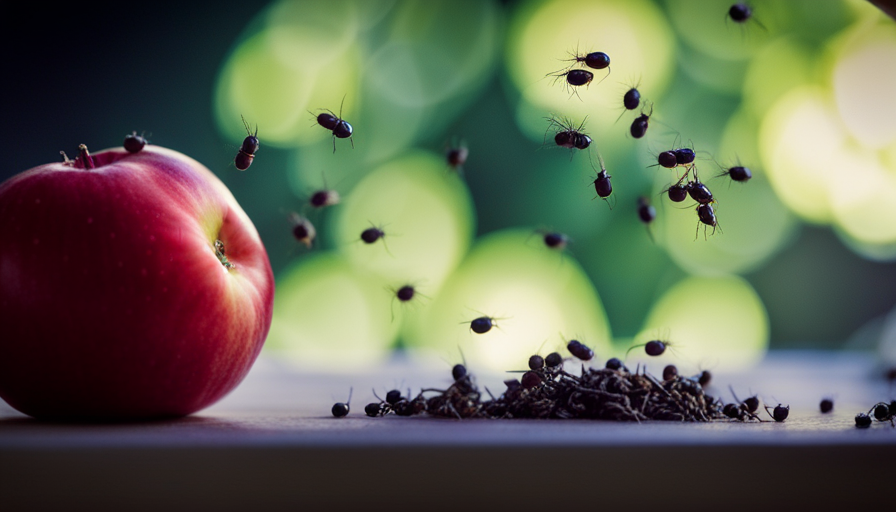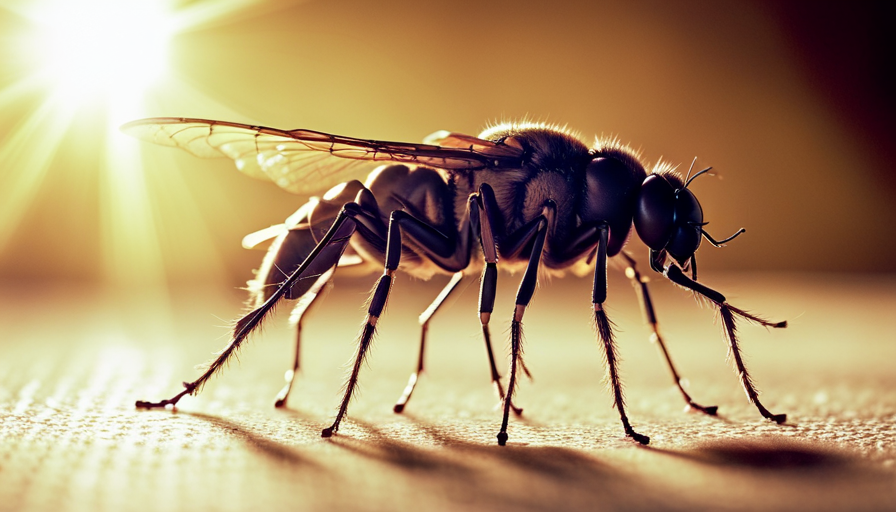Have you ever found yourself swatting at those annoying tiny flies that seem to be everywhere in your home? I know I have! It can be really frustrating, can’t it? But fear not, because I’m here to uncover the mystery of these pesky black flies and help you solve your buzzing problem.
In this informative article, we will explore the different types of tiny black flies that may be infesting your home. By understanding their characteristics and habits, we can better identify the source of the infestation. We’ll also discuss various prevention measures you can take to keep these flies at bay, as well as natural remedies and chemical solutions for those persistent critters.
If you’re feeling overwhelmed and nothing seems to work, don’t worry – I’ll provide some guidance on when it’s time to call in the professionals. So, let’s dive in and uncover the secrets of those tiny black flies that seem to have taken up residence in our humble abodes.
Together, we’ll conquer this buzzing nuisance once and for all!
Key Takeaways
- Tiny black flies in the house belong to the family Drosophilidae and are commonly found in overripe fruits, unwashed produce, and moist soil.
- To identify the source of infestation, check for overripe fruits and vegetables, damp organic matter, and standing water.
- Prevention measures include removing and disposing of rotten produce, properly disposing of organic matter, and regularly cleaning and drying water sources.
- Natural remedies such as homemade traps, essential oils, and vinegar and dish soap solutions are effective in repelling and eliminating tiny black flies.
Types of Tiny Black Flies
Hey, ever wonder what those pesky little black flies in your house are? Well, there are various types of tiny black flies that can invade our living spaces. These flies belong to the family Drosophilidae, which includes fruit flies and fungus gnats. Understanding their lifecycle stages and common breeding grounds can help us identify the source of infestation.
The lifecycle of these flies consists of four stages: egg, larva, pupa, and adult. Eggs are usually laid in moist organic matter, such as decaying fruits, vegetables, or damp soil. After hatching, the larvae feed on the organic material and undergo several molts before entering the pupal stage. Once the pupae develop, adult flies emerge and begin their quest for food and breeding.
Common breeding grounds for these tiny black flies include overripe fruits, unwashed produce, and moist soil. Fruit flies are particularly attracted to fermented fruits, while fungus gnats thrive in damp areas with decaying plant matter. It’s important to eliminate these breeding grounds to prevent further infestations.
Understanding the lifecycle and common breeding grounds of these tiny black flies can help us identify the source of infestation and take appropriate measures to eliminate them from our homes. Now, let’s dive into the next section and learn more about identifying the source of infestation.
Identifying the Source of Infestation
To identify where these pesky critters are coming from, take a closer look at the potential sources of infestation. Here are the common breeding grounds for tiny black flies:
-
Overripe fruits and vegetables: These flies are attracted to the fermenting sugars in overripe fruits and vegetables, making them a common breeding ground. Check your fruit bowls and vegetable bins for any rotten produce.
-
Damp organic matter: Tiny black flies thrive in moist environments, such as decaying plants, wet soil, or compost piles. Inspect your houseplants, flowerpots, and any areas where organic matter may be decomposing.
-
Standing water: Stagnant water can serve as a breeding site for these flies. Look for any water sources that have been left undisturbed, such as pet water bowls, potted plant saucers, or clogged drains.
To eliminate breeding sites and prevent further infestation, consider the following steps:
-
Remove and dispose of overripe fruits and vegetables promptly.
-
Properly dispose of organic matter and maintain dry conditions in and around your home.
-
Regularly clean and dry water sources to prevent standing water.
By addressing these potential breeding grounds, you can significantly reduce the population of tiny black flies in your house. Now, let’s move on to the next section and discuss prevention measures to keep these flies away for good.
Prevention Measures
One effective way to keep these pesky insects away for good is by implementing prevention measures. By taking proactive steps, you can create an environment that discourages the growth and presence of tiny black flies in your house. Incorporating natural deterrents and maintaining regular cleaning routines are two key strategies to prevent infestations.
To begin, let’s explore some natural deterrents that can help repel these flies. The table below highlights three effective options:
| Natural Deterrents | How to Use | Benefits |
|---|---|---|
| Citronella | Use candles or essential oil in strategic areas | Repels flies and other insects |
| Peppermint | Place dried peppermint leaves in infested areas | Strong aroma deters flies |
| Vinegar | Create a vinegar trap by mixing vinegar and dish soap | Traps and kills flies |
In addition to natural deterrents, maintaining a clean and tidy house is crucial. Flies are attracted to dirt, food residue, and moist environments. Regularly clean your kitchen, dispose of garbage properly, and keep food stored in sealed containers. By doing so, you can minimize potential breeding grounds and discourage the presence of these pesky insects.
Next, we will explore natural remedies that can effectively eliminate existing infestations.
Natural Remedies
In my research on natural remedies to deal with tiny black flies in my house, I’ve come across several effective methods. Homemade traps can be made using simple materials like a plastic bottle and apple cider vinegar, which lures the flies into the trap.
Essential oils, such as lavender or eucalyptus, can also be used to repel the flies since they dislike the strong scent.
Additionally, a solution made with vinegar and dish soap can be sprayed on surfaces to kill and deter the flies.
Lastly, reducing moisture levels in the house can make it less attractive to these flies since they are often attracted to damp areas.
Homemade traps
Try using a homemade trap to catch those pesky tiny black flies buzzing around your house like a fly to honey. Homemade traps are an effective and natural way to control the population of these annoying insects.
To make a simple trap, you’ll need a jar, apple cider vinegar, dish soap, and plastic wrap. First, pour a small amount of apple cider vinegar into the jar and add a few drops of dish soap. The vinegar will attract the flies, while the dish soap will make them unable to escape.
Cover the jar with plastic wrap and poke a few small holes in it. Place the trap in areas where you have noticed the most fly activity. The flies will be lured in by the scent of the vinegar and become trapped inside the jar.
This homemade trap is a cost-effective and eco-friendly alternative to DIY fly repellents and fly larvae control.
Transitioning into the next section, essential oils can also be used to repel these flies in a natural and effective way.
Essential oils
Harness the power of essential oils to banish those pesky pests and transform your home into a fragrant sanctuary. Essential oils have long been utilized for their aromatherapy benefits, and they can also serve as a natural way to deter flies. By using essential oil diffusers strategically placed throughout your house, you can effectively repel those tiny black flies. Certain essential oils, such as lavender, peppermint, and eucalyptus, are particularly effective in warding off insects. These oils emit strong scents that flies find unpleasant, causing them to steer clear of your living space. Additionally, essential oils have the added benefit of creating a calming and inviting atmosphere in your home. So, why not harness the power of nature’s scents to keep those flies at bay? Transitioning into the next section, another method that can prove useful is a vinegar and dish soap solution.
Vinegar and dish soap solution
To effectively tackle those pesky flying insects, whip up a powerful solution using vinegar and dish soap. This simple yet effective remedy is a natural and non-toxic way to get rid of fruit flies and fungus gnats in your house.
The acidic nature of vinegar helps to repel these tiny black flies, while the dish soap acts as a surfactant to break the surface tension of the solution, making it easier for the flies to drown.
- Mix equal parts of vinegar and water in a spray bottle.
- Add a few drops of dish soap to the mixture.
- Shake well to combine all the ingredients.
Spray this solution in areas where you have noticed the presence of fruit flies or fungus gnats. The vinegar will act as a deterrent and the dish soap will ensure that the flies are trapped and unable to escape. This solution is an effective way to eliminate these annoying insects.
Reducing moisture levels in your home is another crucial step to prevent the reoccurrence of these flies.
Reducing moisture levels
One way you can reduce moisture levels in your home is by using a dehumidifier, which can lower the humidity levels by up to 50%. A dehumidifier works by drawing in moist air, cooling it, and then collecting the water vapor as condensation. This helps to remove excess moisture from the air, making your home less hospitable to tiny black flies and other pests that thrive in humid environments.
To further prevent moisture buildup, consider implementing ventilation solutions. Properly ventilating your home can help to circulate air and reduce humidity levels. This can be achieved by opening windows, using exhaust fans in kitchens and bathrooms, and ensuring that air vents are unblocked. By reducing moisture levels and improving ventilation, you can create an environment that is less favorable for the growth of these flies.
Next, we will explore chemical solutions to address the issue of tiny black flies in your home.
Chemical Solutions
There’s a chemical spray you can use to get rid of those tiny black flies in your house. Chemical solutions are effective in eliminating these pests, but it’s important to use them safely and responsibly. Here are some key points to consider when using chemical solutions for fly control:
-
Choose a pesticide alternative: There are various insect repellents available in the market that are specifically designed to target flies. Look for products that contain active ingredients like pyrethrin or pyrethroid, as they’re known to effectively repel and kill flies.
-
Follow the instructions: Read and follow the instructions provided by the manufacturer carefully. This’ll ensure that you use the chemical spray correctly and get the desired results. Using too much or too little of the product may not yield the desired effect.
-
Take necessary precautions: Wear protective clothing, such as gloves and a mask, when applying the chemical spray. Keep children and pets away from the treated area until it’s safe to re-enter. Additionally, ensure proper ventilation to avoid inhaling the chemicals.
-
Consider professional help: If the infestation persists despite your efforts, it may be time to consider hiring a pest control professional. They have the knowledge and expertise to effectively eliminate the flies and prevent future infestations.
By following these guidelines, you can effectively use chemical solutions to combat the tiny black flies in your house. However, if the problem persists, it may be wise to seek the assistance of a pest control professional for a more comprehensive solution.
Hiring a Pest Control Professional
After considering chemical solutions for dealing with the tiny black flies in my house, I’ve decided to explore the option of hiring a pest control professional.
While chemical solutions can be effective, they often require repeated applications and may not completely eliminate the infestation. Additionally, I’m concerned about the potential health risks associated with these chemicals.
By hiring a pest control professional, I hope to address the root cause of the issue and ensure a more thorough eradication of the tiny black flies.
One important factor to consider when hiring a professional is the cost. While it may seem expensive initially, the long-term effectiveness of their services can make it a worthwhile investment.
Pest control professionals have the knowledge and expertise to identify the source of the infestation and implement targeted solutions. They use a combination of techniques, such as inspection, trapping, and insecticide application, to effectively eliminate the tiny black flies and prevent future outbreaks.
Furthermore, pest control professionals have access to specialized equipment and products that aren’t available to the general public. This allows them to tackle the infestation more effectively and efficiently.
Hiring a pest control professional can be a cost-effective and efficient solution for eradicating tiny black flies. Their expertise, specialized equipment, and targeted approach can ensure a more successful elimination of the infestation.
Frequently Asked Questions
How long do these tiny black flies typically live?
The lifespan of tiny black flies can vary depending on several factors. These include environmental conditions, availability of food and water, and the presence of predators.
Can these flies transmit any diseases to humans or pets?
These tiny black flies can transmit diseases to humans and pets, posing health risks. Prevention measures include proper sanitation, eliminating breeding sites, and using insecticides. It is important to take precautions to avoid potential disease transmission from these flies.
Are there any specific plants or foods that attract these flies?
Specific plants that attract tiny black flies include overripe fruits, decaying vegetables, and damp soil. Foods that can attract them are sugary substances, such as spilled juices or soda.
Can these flies cause damage to furniture or household items?
These flies do not cause damage to furniture or household items. However, they can affect indoor air quality. To prevent infestation, keep your house clean, remove any decaying organic matter, and use fly traps or insecticides if necessary.
Are there any specific signs or indicators of a severe infestation that I should be aware of?
Severe infestation indicators include a sudden increase in fly population, finding larvae or pupae, and multiple breeding sites. To effectively get rid of tiny black flies, clean and remove organic matter, use traps, and maintain good hygiene practices.
Conclusion
In conclusion, dealing with tiny black flies in the house can be a frustrating experience. However, by identifying the source of infestation and implementing prevention measures, such as keeping the house clean and dry, one can effectively control these pests.
Interestingly, according to a study conducted by the National Pest Management Association, tiny black flies are commonly attracted to moist and decaying organic matter, making it crucial to eliminate such sources to prevent infestations.
If the problem persists, it’s advisable to consult a pest control professional for assistance.
Hi, I’m Emma. I’m the Editor in Chief of Tiny House 43, a blog all about tiny houses. While tree houses are often associated with childhood, they can be the perfect adult retreat. They offer a cozy space to relax and unwind, surrounded by nature. And since they’re typically built on stilts or raised platforms, they offer stunning views that traditional homes simply can’t match. If you’re looking for a unique and romantic getaway, a tree house tiny house might just be the perfect option.










